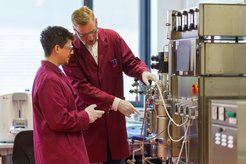eversyn awarded with EXIST Research Transfer Grant for the Production of Glycans for Food and Pharma Industry
Spin-off Project of the Max Planck Institute Magdeburg
eversyn is a start-up of the Department of Bioprocessing Engineering at the Max Planck Institute for Dynamics of Complex Technical Systems in Magdeburg. The project has been awarded an EXIST Research Transfer grant of over € 900,000 to support its spin-off activities. eversyn will use its proprietary, cost-efficient and highly scalable technology for the synthesis of nucleotide sugars and valuable oligosaccharides that are in high demand in food and pharma industry.
Glycans for Food Industry and Biopharmaceutical Applications

Rachel Thu Nguyen, Alberto Alcalá Orozco, Sebastian Bruno Kleeberg, Dr. Thomas Rexer, Dr. Mariana Juárez-Osorio
Free or protein-bound sugar structures, so-called oligosaccharides or glycans, fulfill important biological functions that are central to human health. Accordingly, there are great benefits in utilizing them as food additives or tailoring them as natural occurring parts on biopharmaceuticals. Prominent examples are human milk oligosaccharides for infant formula milk and glycans for production of monoclonal antibodies. The bottlenecks for their application are the high cost of glycans and challenges related to process scale-up. In particular, many of the building blocks of glycans – nucleotide sugars or activated sugars – are hardly available in larger amounts. With purchase prices of around 2,000-15,000 €/g, the enzymatic synthesis of oligosaccharides is at present economically not feasible for manufacturing at industrial scale.
Tackling these Challenges with Optimized Enzyme Networks

eversyn's proprietary technology is based on the efficient use of novel cell-free biocatalytic cascades developed by the Synthetic Biotechnology team (headed by Dr. Thomas Rexer) in the Bioprocess Engineering Department at the Max Planck Institute Magdeburg. In recent years, the team has optimized enzyme networks to produce nucleotide sugars orders of magnitude cheaper than before. Building on this, the scientists have developed biocatalysts to produce valuable oligosaccharides or to control the glycosylation of therapeutic proteins.
As part of the EXIST research transfer program, this project is funded by the German Federal Ministry of Economics and Climate Protection (BMWK), the European Union and the Max Planck Society from February 2022 to January 2024.

